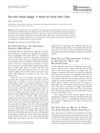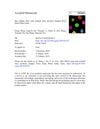 May 2019 in “Journal of Clinical Dermatology”
May 2019 in “Journal of Clinical Dermatology” Metformin helps hair growth by affecting cell signals related to hair follicle development.
January 2019 in “대한피부과학회지” Metformin promotes hair growth by affecting cell growth and protein signaling related to hair growth.
 136 citations,
February 2017 in “International Journal of Molecular Sciences”
136 citations,
February 2017 in “International Journal of Molecular Sciences” PRP treatment improves hair growth, and the device used can affect results, with some being more effective.
 19 citations,
July 2011 in “Microscopy and Microanalysis”
19 citations,
July 2011 in “Microscopy and Microanalysis” The hair follicle bulge is an important area for adult stem cells involved in hair growth and repair, with potential for medical use needing more research.
 5 citations,
October 2022 in “Frontiers in bioengineering and biotechnology”
5 citations,
October 2022 in “Frontiers in bioengineering and biotechnology” Ro stress hindered ginseng root growth and ginsenoside production, but increased certain hormones and affected gene regulation related to plant growth and stress responses.
1 citations,
August 2022 in “Journal of Drugs in Dermatology” More frequent PRP sessions with shorter intervals improve hair loss treatment.
 April 2017 in “Journal of Investigative Dermatology”
April 2017 in “Journal of Investigative Dermatology” Researchers improved a method to study individual cells in newborn mouse skin and found a way to assess the severity of a skin condition in humans.
 14 citations,
January 2006 in “Skin pharmacology and physiology”
14 citations,
January 2006 in “Skin pharmacology and physiology” Procyanidin compounds from apples and barley promote hair growth and prevent hair cell death.
 21 citations,
January 2022 in “Biomaterials Science”
21 citations,
January 2022 in “Biomaterials Science” RNA delivery is best for in-body use, while RNP delivery is good for outside-body use. Both methods are expected to greatly impact future treatments.
 92 citations,
September 2019 in “ACS nano”
92 citations,
September 2019 in “ACS nano” A wearable device using electric stimulation can significantly improve hair growth.
53 citations,
April 2016 in “Stem cell research & therapy” LL-37 helps stem cells grow and move, aiding tissue regeneration and hair growth.
 104 citations,
May 2019 in “F1000Research”
104 citations,
May 2019 in “F1000Research” Losing weight, fixing varicoceles, and using advanced sperm selection methods improve male infertility treatment outcomes.
61 citations,
October 2011 in “Experimental dermatology” Scalp itching is common and hard to diagnose due to the complex nerve structure of the scalp.
 3 citations,
July 2020 in “Frontiers in Cell and Developmental Biology”
3 citations,
July 2020 in “Frontiers in Cell and Developmental Biology” Vitexin Compound 1 may help reduce skin aging caused by UVA light.
2 citations,
April 2011 in “InTech eBooks” Non-denatured soybean extracts provide multiple anti-aging skin benefits.
 4 citations,
September 2020 in “Journal of Cosmetic Dermatology”
4 citations,
September 2020 in “Journal of Cosmetic Dermatology” PRP treatment significantly increased hair density and thickness in male hair loss.
 4 citations,
October 2019 in “Skin appendage disorders”
4 citations,
October 2019 in “Skin appendage disorders” PRP injections safely increase hair density and thickness in androgenetic alopecia.
4 citations,
January 2016 in “Methods in molecular biology” Hair follicle stem cells can become nerve cells using specific treatments.
2 citations,
October 2008 in “InTech eBooks” Non-denatured soybean extracts are effective for skin care, offering skin lightening, anti-aging, and UV protection benefits.
6 citations,
December 2019 in “Frontiers in genetics” GLI1 might protect against the start of skin cancer and is not linked to cancer severity.
 April 2023 in “The journal of investigative dermatology/Journal of investigative dermatology”
April 2023 in “The journal of investigative dermatology/Journal of investigative dermatology” The TRPV3 channel structure changes linked to severe itch and hyperkeratosis were identified using cryo-EM.
 April 2016 in “Journal of Investigative Dermatology”
April 2016 in “Journal of Investigative Dermatology” Boosting HGF signaling could improve the creation of hair follicles in lab-made skin.
 16 citations,
February 2019 in “Gene”
16 citations,
February 2019 in “Gene” Researchers found a good way to isolate hair follicle stem cells from newborn goats for further study.
July 2014 in “Faculty Opinions – Post-Publication Peer Review of the Biomedical Literature” AA-PRP injections significantly promote hair growth but need better study design for clear efficacy.
21 citations,
October 2017 in “Cell death and disease” Sesn2 protects inner ear hair cells from damage by regulating certain cell survival pathways.
17 citations,
May 2018 in “BMC genomics” Researchers found genes and microRNAs that control curly fleece in Chinese Tan sheep.
 2 citations,
July 2023 in “Plant Disease”
2 citations,
July 2023 in “Plant Disease” Some maize lines resist stalk rot better due to specific genes and enzyme activities.
 13 citations,
November 2021 in “Biomedicines”
13 citations,
November 2021 in “Biomedicines” Plasma-activated liquid can kill harmful cells, speed up wound healing, and potentially treat cancer without damaging healthy cells.
A molecule called α-ketobutyrate was found to extend lifespan and improve aging-related symptoms in worms and mice by activating certain cellular pathways and may help develop anti-aging treatments for humans.
 1 citations,
February 2023 in “All Life”
1 citations,
February 2023 in “All Life” The research identified proteins that change as goat hair follicles begin to form, helping to understand how cashmere grows.


















